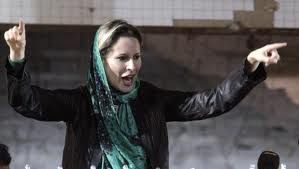Qaddafi's Daughter Rips Obama, Hillary
Ms. Qaddafi has appeared in public twice since the bombings began, before cheering crowds at the colonel’s compound, but she seldom speaks in public. During the interview, she wore close-fitting jeans, Gucci shoes and a pale scarf that did not cover her long blond hair. At times, she laughed at her fate, recalling how the United Nations, after “begging” her to be an envoy for peace in the past, has now referred her to the International Criminal Court. Her staff presented an illustrated biography entitled “Princess of Peace.”
She said her experience as a volunteer on Saddam Hussein’s defense team offered relevant parallels.
“The opposition in Iraq told the West that when you come to Iraq they will greet you with roses,” she said. “Almost 10 years later they are receiving the Americans with bullets, and, believe me, the situation in Libya will be much worse.”
She taunted both President Obama and Mrs. Clinton, saying that Mr. Obama had “achieved nothing so far” and laughing as she posed a question to Mrs. Clinton: “Why didn’t you leave the White House when you found out about the cheating of your husband?”
Even as she deprecated the American leaders, she repeatedly called for talks. “The world should come together at a round table,” she said, “under the auspices of international organizations.”
At the same time, she ruled out any dialogue with the Libyan rebels who now control the eastern half of the country; its commercial center, Misurata; and the western mountain towns of Zintan and Nalut, dismissing them as “terrorists” who “are just fighting for the sake of fighting.”
Under her brother Seif’s unofficial leadership, she said, the Libyan government had been on the verge of unveiling a constitution as a step toward democratic reform when “this tragedy happened and spoiled things.”
At the same time, she also derided, and possibly misunderstood, the basic ideas of checks and balances and public accountability in an electoral democracy. “Let me say something about the Western elections that they say are a democratic system of ruling,” she volunteered, referring to handwritten notes she had prepared for the interview. In an election where one candidate won with 50 percent of the vote and another lost with 48 percent, she asked, “Do you call this democracy? Just this one vote? What happened to the 48 percent who said ‘no’?”
She complained of the “betrayal” of Arabs whose causes her father had supported and the Western allies to whom he had turned over his weapons of mass destruction. “Is this the reward that we get?” she asked. “This would lead every country that has weapons of mass destruction to keep them or make more so they will not meet the same fate as Libya.”


